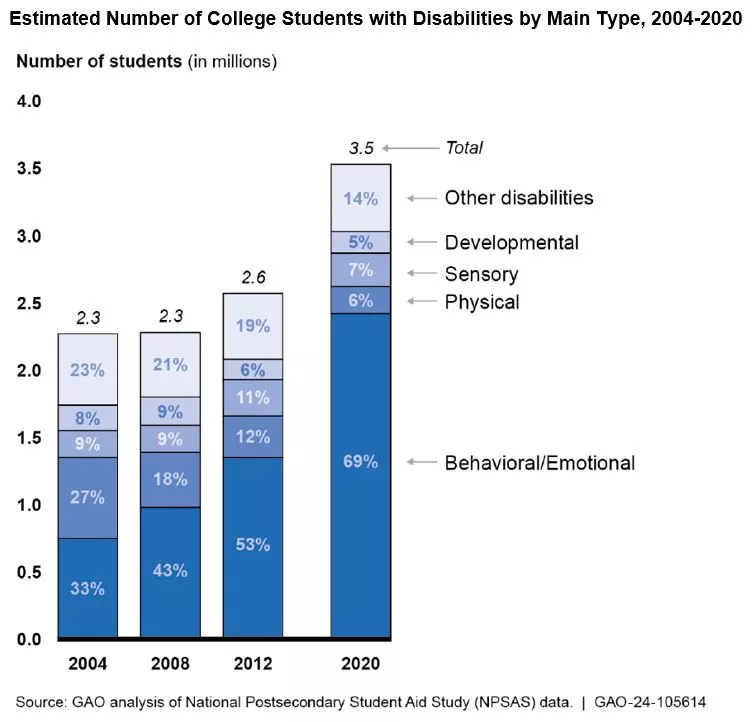For Disability Pride Month—We Highlight Our Work on College Campus Access Issues
The percentage of college students with disabilities has nearly doubled during the last two decades—with as many as 21% reporting a disability in 2020. These students face additional challenges in college, which can reduce their chances of graduating.
To help students overcome challenges, colleges and universities are generally required to provide reasonable accommodations and access to supports. But many students may not know how to ask for this help.
In recognition of Disability Pride Month (July), today’s WatchBlog post looks at our recent work on disability access on college campuses.
Image

More college students are reporting disabilities, but access remains an issue
An estimated 3.5 million students with disabilities are in college. An increase in students reporting behavioral or emotional conditions—such as depression and attention deficit disorders —account for much of the growth in this population. Combined, students with these disabilities made up about 69% of all students reporting disabilities in 2020, the most recent year for available data.
Image

Although they’re more common, college students with disabilities still struggle to achieve the same academic results as those without. For example, we found that students with disabilities may have lower GPAs and more of them left school without obtaining a degree than students without disabilities. For these reasons, it is important that these students, who are growing in number, receive the reasonable accommodations and help they need to meet their potential. But sadly, we found many still lack access for a variety of reasons.
Unaware or unprepared. Adjusting to college life is often hard for new students. While all must learn to navigate their new campus and sign up for classes, students with disabilities must also figure out how to apply for the disability supports they need.
Newly diagnosed students may not know they qualify for accommodations (like extra time to take tests). But even if they do know, many students (who are often still teenagers) may be unaware or unprepared to advocate or request the accommodations they need. For example, one student told us that up until college, students’ parents advocated for the supports they needed in school. But now this responsibility falls to students themselves, who could also be responsible for setting up meetings and completing the paperwork required to receive a reasonable accommodation. Similarly, students also may not know what documentation they need or may not have the required documentation with them at college. This can lead to accommodation requests being rejected.
Some faculty are reluctant to help. College faculty may also be an issue. Students told us that faculty sometimes think that students are trying to cheat or gain an unfair advantage. Faculty may also view accommodations as extra work. For example, providing extra time for tests may increase workloads if the faculty must proctor the exams themselves.
What more can be done to help students with disabilities get the access they need?
First, colleges and universities could do more to train their faculty and help students understand their eligibility for assistance and reasonable accommodations.
At the same time, the Department of Education—which oversees compliance with disability laws in public schools—could do more to help students and college staff understand the range of supports and resources available.
In our April report, we found that Education provides guidance materials to help students advocate for the accommodations they need. But this information may not reach students transitioning from high school. We recommended Education work with state and local education authorities to provide these resources to high schoolers planning for college.
Education also doesn’t provide updates to college staff on the latest information about accommodations for students with disabilities, despite providing notification on other topics. We recommended Education do more here too.
Finally, Education provides grants to schools and organizations to help disadvantaged students—including students with disabilities—graduate from college. But in a February 2023 report, we found that Education doesn’t collect the information needed to determine whether its grants program is reaching the students it was designed to serve. We recommended Education take the steps needed to collect this information. We also designated our recommendation as a “priority recommendation” —meaning that immediate action is needed and if taken would have a significant impact on Education’s ability to assess whether this program is helping individuals with disabilities.
- GAO’s fact-based, nonpartisan information helps Congress and federal agencies improve government. The WatchBlog lets us contextualize GAO’s work a little more for the public. Check out more of our posts at GAO.gov/blog.
GAO Contacts
Related Products

GAO's mission is to provide Congress with fact-based, nonpartisan information that can help improve federal government performance and ensure accountability for the benefit of the American people. GAO launched its WatchBlog in January, 2014, as part of its continuing effort to reach its audiences—Congress and the American people—where they are currently looking for information.
The blog format allows GAO to provide a little more context about its work than it can offer on its other social media platforms. Posts will tie GAO work to current events and the news; show how GAO’s work is affecting agencies or legislation; highlight reports, testimonies, and issue areas where GAO does work; and provide information about GAO itself, among other things.
Please send any feedback on GAO's WatchBlog to blog@gao.gov.




